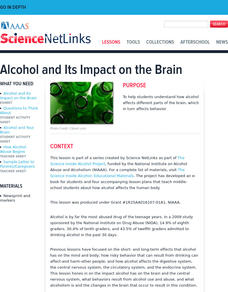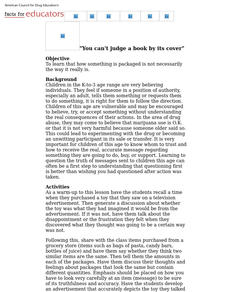Curated OER
Enzymes
Tenth graders test their saliva for enzyme activity. In this enzyme lesson, 10th graders conduct an experiment to test the enzymatic activity of their saliva. They relate the lack of certain digestive enzymes with alcoholism.
Curated OER
Family Sculpture Demonstration
Young scholars simulate the personal interactions in a family with an alcoholic parent. In this alcoholism lesson, students read a family situation. They simulate the interactions in the family and create a living sculpture of the...
Baylor College
Mapping the Spread of HIV/AIDS
Where is HIV/AIDS most prevalent and what are the current trends regarding HIV? Have groups work together to map the world's HIV/AIDS rates, then create a class map with all the data. Lesson includes cross-disciplinary concepts including...
Baylor College
Pre-Assessment: The Brain
Break your class in to the general structure and function of the brain. Brainiacs discuss what they know about it and create personalized brain development timelines. They also take a true-false, pre-assessment quiz to get them thinking...
Baylor College
Neurotransmitters Contain Chemicals
Human body systems learners play a card game, "Locks & Keys" in order to learn that neurotransmitters carry a message from one neuron to another by fitting into a receptor site on the receiving nerve cell. While this activity can...
Baylor College
Neural Network Signals
Using a simple circuit with the battery representing the brain, future physiologists test to see which solutions conduct electrical "nerve impulses." Enlighten learners with plentiful information on electric signals in the nervous system...
Baylor College
Modeling an HIV Particle
Models are an important part of science; they help us see the world on a scale that works for us. In the first of five lessons on HIV, learners make a paper model of the HIV virus that is about 500,000 times larger than the actual virus....
Baylor College
HIV/AIDS in the United States
In the final of five lessons about HIV/AIDS, groups create presentations to share data about the infection rates in the United States, examining demographic and geographic trends over the past ten years. Depending on how much time you...
Baylor College
Hormones and Stress
As a more personal part of a unit on brain chemistry, your class discusses stressful situations and the body's response to them. They talk about how, while the reactions are initially helpful, some can be harmful to your health. Finally,...
Baylor College
Food for the Brain
With a couple of neat diagrams on student handouts, your life science or health class will examine the contents and serving sizes of healthy foods. They dissect a slice of pizza and scrutinize the nutritional value of its components in...
Baylor College
Post-Assessment: Brain Chemistry
If you have implemented this fabulous brain chemistry unit in its entirety, you should have saved the pre-assessment quizzes from day one. In this assignment, individual learners go back over their original answers, and correct any...
Baylor College
Making Copies of an HIV Particle
In the second of five lessons about HIV, discover the mechanisms that allow the HIV virus to replicate. Using the models that they created the day before, learners examine the parts of the virus particle. The lesson plan does not say...
Curated OER
Jimmy Carter: Civic Action, Lesson 1
Inspired by the humanitarian work of President Jimmy Carter after he left office, high schoolers explore the history of civic action in the United States and generate ideas about problems at the local, national, and international levels....
Curated OER
Baseball Anyone
Students explore the change in values from the 1920's to the present. In groups, students use the internet to analyze Pete Rose and gambling in sports. The 1919 scandal of the World Series is explored and discussed by students. They...
Curated OER
Addressing Community Problems
Students discuss how to solve problems in the community. In this character education lesson, students brainstorm major problems in their neighborhoods and list them on the board. Students are divided into groups and focus on one topic to...
Curated OER
Money and health
Students write a proposal with an appropriate budget to establish a health day at school. They design this day to educate and promote good health. They educate other students about health care, inform students of health concerns, and...
Curated OER
Alcohol and Its Impact on the Brain
Students examine water as it changes states. In water and ice lesson students study the water cycle and what happens to it as it changes state.
Curated OER
You can't judge a book by its cover
Students examine how how something is packaged is not necessarily the way it really is.
Curated OER
Healthy Living: How Does this Web Site Impact Medicare?
Students assess information on the Health Canada Web site and determine whether such information should be paid for with tax dollars, and whether the publication of such information has an impact on Medicare.
Curated OER
AIDS and Adolescence
Ninth graders examine the relationship between AIDS and teenagers. In groups, they discuss the various issues educators face in introducing the topic to teenagers in school. As a class, they brainstorm a list of the misconceptions they...
Curated OER
Introduction to Correlations
Young scholars investigate correlations between human body height and other human features. They select ten subjects and record each subject's age and gender and measure for height, wingspan, distance, and size of hands. After measuring,...
Utah State Courts
Judges in the Classroom
Class members explore the process of a disposition hearing for juveniles, particularly looking at how the judge decides what sentence the juvenile offender should receive. Task your pupils with evaluating different sample cases provided...
Curated OER
Teen Health: Talking with Your Doctor
Learners discuss common health care issues they're facing today. In this health science lesson, students explain the benefit of seeking professional help. They write a journal to keep track of their own health issues.
Curated OER
Gangs and Bullies
Students discuss bullying. They listen to or read the story "Kids Join Gangs to Beat the Bullies." Students role-play bullying situations and discuss possible outcomes. Role play ideas and the link for the story are included with the...
Other popular searches
- Drug Abuse Posters
- Drug Abuse Lesson Plans
- Alcohol and Drug Abuse
- Drug Abuse Prevention
- Prescription Drug Abuse
- Effects of Drug Abuse
- Drug Abuse Play
- Drug Abuse Projects
- Drug Abuse Survey
- Drug Abuse and Prevention
- Drug Abuse Factors
- World Drug Abuse

























